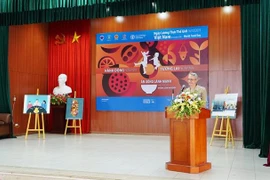 One in every three Vietnamese children under the age of five is either malnourished or overweight as a result of poor diets and a food system that is failing them. (Illustrative image. Source: VNA)
One in every three Vietnamese children under the age of five is either malnourished or overweight as a result of poor diets and a food system that is failing them. (Illustrative image. Source: VNA)Hanoi (VNA) – One in every three Vietnamesechildren under the age of five is either malnourished or overweight as a resultof poor diets and a food system that is failing them, heard a ceremony in Hanoion October 16 to release the UNICEF’s State of the World’s Children 2019report.
The report provides a comprehensive assessment of 21st-centurychild malnutrition in all its forms. It describes a triple burden of malnutrition,namely undernutrition, hidden hunger caused by a lack of essential nutrients,and overweight among children under the age of five.
The report warns that poor eating and feeding practicesstart from the earliest days of a child’s life. This finding was highlighted bya landscape analysis carried out by the Vietnam National Institute of Nutritionin 2019 on complementary feeding and maternal nutrition as part of the RegionalInitiative for Sustained Improvements in Nutrition and Growth (RISING). The analysisshowed that complementary feeding practices and maternal nutrition in Vietnamare largely inadequate and inappropriate, contributing to the burden ofmalnutrition.
In Vietnam, inadequate maternal diets lead to underweightand overweight women who are more likely to have low birth weight babies. Meanwhile,inadequate diets during the complementary feeding phase, when the first foodsare introduced to young children aged between 6 months and 2 years, are commonin the country.
According to the 2015 national nutrition surveillance, 18percent of the children do not have a diet that is sufficiently diverse and 36percent are not fed frequently enough.
Speaking at the event, Deputy Prime Minister Vu Duc Dam saidmalnutrition among Vietnamese, particularly children, remains at a high levelcompared to other nations in the region.
He added that there is 57 percent of the local populationeating a diet that lacks of vegetables and nutrition but contains high sodium andstarch intake.
The official tasked the Ministry of Health with boostingmeasures to tackle the issue, particularly at alarming areas like the northernmountainous and Central Highlands regions as well as working with relevantagencies to improve the diets of women and young children.
On the occasion, Dam, UNICEF representatives, and otherdelegates signed a commitment to improving the diets of women and youngchildren during the complementary feeding period./.



























